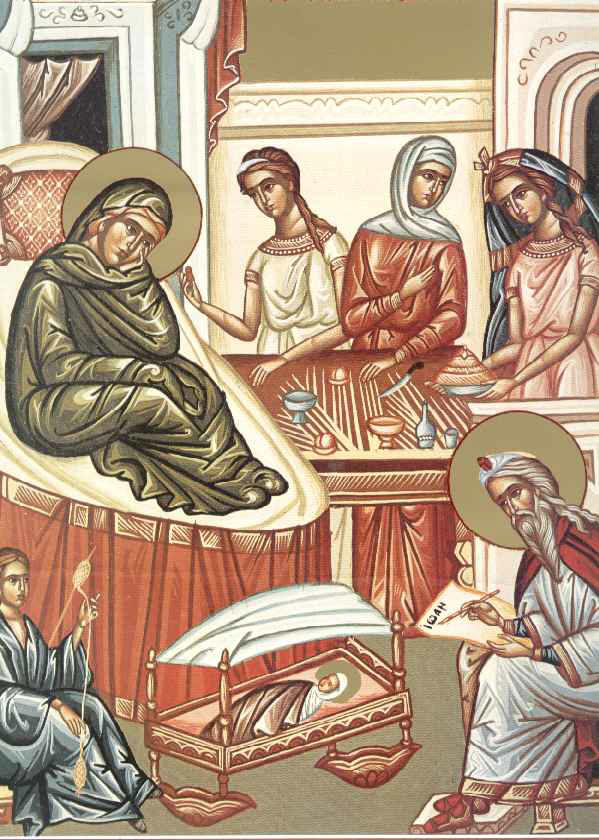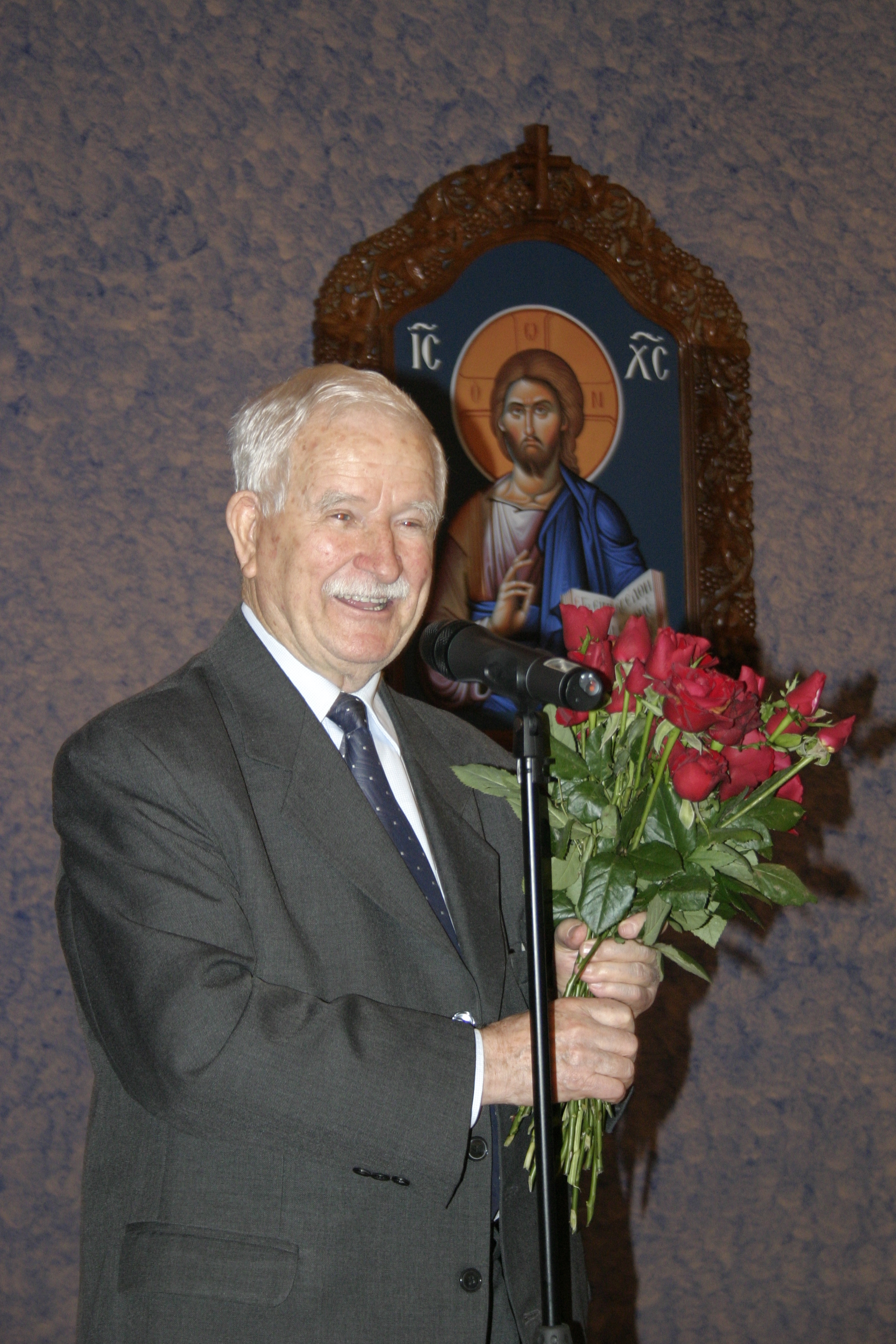Translation from the book:
Στεργίου Ν. Σάκκου, Ἑρμηνεία στό κατά Λουκᾶν Εὐαγγέλιο, τόμ. Α΄,
ἐκδ. «ΧΡΙΣΤΙΑΝΙΚΗ ΕΛΠΙΣ» ΟΡΘΟΔΟΞΗ ΑΔΕΛΦΟΤΗΤΑ, Θεσ/νίκη 2008, σσ.74-87
(Stergios N. Sakkos [Read CV], A Commentary on the Gospel according to St. Luke, vol. A', pp. 74-87)
1,57-58. Τῇ δὲ Ἐλισάβετ ἐπλήσθη ὁ χρόνος τοῦ τεκεῖν αὐτήν, καὶ ἐγέννησεν υἱόν. Καὶ ἤκουσαν οἱ περίοικοι καὶ οἱ συγγενεῖς αὐτῆς ὅτι ἐμεγάλυνε Κύριος τὸ ἔλεος αὐτοῦ μετ᾿ αὐτῆς, καὶ συνέχαιρον αὐτῇ.
1:57-58 When it was time for Elizabeth to have her baby, she gave birth to a son. Her neighbors and relatives heard that the Lord had shown her great mercy, and they shared her joy.
 When “it was time”, that is, the required nine months were fulfilled, Elizabeth gave birth to a son. The expression “the Lord had shown her great mercy” means that the Lord showed her his magnitude of mercy (cf. Ps 56:11) because He made her worthy, while she was sterile and even in an old age, of becoming a mother.
When “it was time”, that is, the required nine months were fulfilled, Elizabeth gave birth to a son. The expression “the Lord had shown her great mercy” means that the Lord showed her his magnitude of mercy (cf. Ps 56:11) because He made her worthy, while she was sterile and even in an old age, of becoming a mother.
Elizabeth's neighbors and relatives “shared her joy” as soon as they heard the news. The pre-announcement of the Angel had already begun to be fulfilled; many were happy with the birth of this child (see verse 14).
1,59. Καὶ ἐγένετο ἐν τῇ ὀγδόῃ ἡμέρᾳ ἦλθον περιτεμεῖν τὸ παιδίον, καὶ ἐκάλουν αὐτὸ ἐπὶ τῷ ὀνόματι τοῦ πατρὸς αὐτοῦ Ζαχαρίαν.
1:59 On the eighth day they came to circumcise the child, and they were going to name him after his father Zechariah.
Jews circumcised every male child eight days after his birth, as required by law (see Gen 17:12, Lev 12:3). The naming took place at the same time. The circumcision of the child was done either by the father (see Gen 17:23) or another person, even a woman (see Ex 4:25), but always by a Jew and never by a heathen.
The newborn child was given the name of his grandfather or father or some other relative. Since in this case the father was deaf and dumb, those present wanted to make him happy by calling his child Zechariah well before his naming. Of course, they would also wait for the mother's consent.
1,60. Καὶ ἀποκριθεῖσα ἡ μήτηρ αὐτοῦ εἶπεν· οὐχί, ἀλλὰ κληθήσεται Ἰωάννης.
1:60 But his mother spoke up and said, “No! He is to be called John”.
Elizabeth responded that the child was to be named John. Apparently, she was informed of the child's name by revelation from the Holy Spirit and spoke like a prophet. If Zechariah had written it to her, they would not need to ask him again (see verse 62). After all, Elizabeth's knowledge, by divine revelation, aroused the surprise and admiration of neighbors and relatives (see verse 63).
1,61-62. Καὶ εἶπον πρὸς αὐτὴν ὅτι οὐδείς ἐστιν ἐν τῇ συγγενείᾳ σου ὃς καλεῖται τῷ ὀνόματι τούτῳ· ἐνένευον δὲ τῷ πατρὶ αὐτοῦ τὸ τί ἂν θέλοι καλεῖσθαι αὐτόν.
1:61-62 They said to her, “There is no one among your relatives who has that name.” Then they made signs to his father, to find out what he would like to name the child.
Those present were puzzled by the choice of this name answered that there was no one among Elizabeth's relatives with that name. Perhaps they feared that Elizabeth, taking advantage of Zechariah’s muteness, wanted to give the child a name of her choice.
Then they signed gestures to Zechariah what name he would like to give the child. The question “what he would like to name the child” is a typical expression, roughly analogous to the phrase: "Godfather, give the name".
1,63. Καὶ αἰτήσας πινακίδιον ἔγραψε λέγων· Ἰωάννης ἐστὶ τὸ ὄνομα αὐτοῦ· καὶ ἐθαύμασαν πάντες.
1:63 He asked for a writing tablet, and to everyone’s astonishment he wrote, “His name is John.”
A “writing tablet” refers to a square or rectangular wooden tablet they used to write on at that time. It was smeared with wax and letters were engraved on it with a small sharp rod made of iron, copper or ivory, called stylus.
The expression “ἔγραψε λέγων” is a Hebrew expression and is translated “he wrote with these words”. So, Zechariah asked for a small writing tablet and wrote the following: “His name is John.” He didn’t say “I want him to be named John”, but “His name is John”, because this name had been already given to him by the angel (see verse 13).
Neighbors and relatives “to everyone’s astonishment” wondered how Zacharias and Elizabeth had agreed to choose the name without prior arrangement.
1,64. Ἀνεῴχθη δὲ τὸ στόμα αὐτοῦ παραχρῆμα καὶ ἡ γλῶσσα αὐτοῦ, καὶ ἐλάλει εὐλογῶν τὸν Θεόν.
1:64 Immediately his mouth was opened and his tongue set free, and he began to speak, praising God.
Zechariah's muteness was the consequence of the punishment imposed on him by the Angel because he did not believe in him (see verse 20). Thus, when, obeying the divine command, he wrote the name of the child, the punishment was resolved and his tongue was immediately set free, as well.
As soon as Zechariah was able to speak, “he began to speak, praising God” he burst out in praise and thanksgiving to God, as seen in the hymn he composed (see verses 68-79). Praise is a form of prayer very pleasing to God. When prayer does not begin and end with personal requests and supplications, it is a sign of a grateful heart. Everything that refers exclusively to the Lord, such as praise, should precede requests.
1,65. Καὶ ἐγένετο ἐπὶ πάντας φόβος τοὺς περιοικοῦντας αὐτούς, καὶ ἐν ὅλῃ τῇ ὀρεινῇ τῆς Ἰουδαίας διελαλεῖτο πάντα τὰ ῥήματα ταῦτα.
1:65 All the neighbors were filled with awe, and throughout the hill country of Judea people were talking about all these things.
People who lived nearby were filled with awe once they were informed of what had happened at Zechariah's house. They were shocked by the way the child was named, by the fact that Zechariah began to speak again, but also by the narration of the heavenly apparition and the angel’s prophecy about John. With all these amazing events they felt the presence of God very close to them and the desire and expectation of the Messiah began to rekindle in them.
These great events, of course, spread throughout the mountainous region of Judea “throughout the hill country of Judea people were talking about all these things”. The word "ῥήμα" in the Holy Bible certainly means “saying” but mainly refers to the event which is the subject of.
1,66. καὶ ἔθεντο πάντες οἱ ἀκούσαντες ἐν τῇ καρδίᾳ αὐτῶν λέγοντες· τί ἄρα τὸ παιδίον τοῦτο ἔσται; Καὶ χεὶρ Κυρίου ἦν μετ᾿ αὐτοῦ.
1:66 Everyone who heard these treasured them in their hearts asking, “What then is this child going to be?” For the Lord’s hand was with him.
It was not possible to be indifferent to what had happened. Everyone put these phrases in their hearts; “Everyone who heard these treasured them in their hearts” they kept them alive in their memory. It was also reasonable to wonder: what is going to become of Zechariah's son?
The expression “Lord’s hand” signifies God’s power and energy. This power is punitive for sinners and helpful to the righteous. Here, of course, it is used in the latter meaning, that the divine power protected the infant.
1,67. Καὶ Ζαχαρίας ὁ πατὴρ αὐτοῦ ἐπλήσθη Πνεύματος ἁγίου καὶ προεφήτευσε λέγων.
1:67 And his father Zechariah was filled with the Holy Spirit, and prophesied, saying.
Zechariah “was filled with the Holy Spirit” (see comments on v. 15). God completely forgave his lack of faith and now uses his mouth as an instrument of the Holy Spirit. His ode, which begins in the next verse, is praise and prophecy at the same time. He praised God for the great blessings he bestowed upon his people, prophesied of the approaching Messiah and of John's mission. (For Hebrew poetry see comments on v. 46).
1,68. Εὐλογητὸς Κύριος, ὁ Θεὸς τοῦ Ἰσραήλ, ὅτι ἐπεσκέψατο καὶ ἐποίησε λύτρωσιν τῷ λαῷ αὐτοῦ.
1:68 Blessed be the Lord, the God of Israel, for he has visited and redeemed his people.
Zechariah belonged to the blessed remnant of Israel, the "λειμμα" (Rom 11:5), which awaited the fulfillment of the covenant which God had made with His chosen people. He saw, therefore, that the time had come for God to fulfill His promises, as he visits his people and grants them redemption. That is why he burst into a hymn full of multitude emotions and theological meanings. Its theme is the condition of fallen humanity and its elevation by the Messiah, in whose presence the great mercy of the Most High is revealed. The hymn is divided into four stanzas with the following content:
(a) Praise (v. 68a)
(b) The cause of praise (vv. 68b-69)
(c) God's promises to the fathers (vv. 70-75)
(d) John as the instrument of God's ministry for the work-purpose of salvation (vv. 76-79).
The expression "blessed be the Lord" is very common in the Bible and mainly in the Psalms. The adjective 'blessed' is attributed only to God - with few exceptions (cf. Deut 7:14; Ruth 2:20) - because only he is absolutely blessed; to him alone belongs all praise, to him belongs all glory, honour and worship. Man as a recipient of God's blessings is characterized as blessed (see v. 28).
“The Lord, the God of Israel” means "Yahweh is the God of Israel." For the expression “Lord God” see comments on v. 16.
In his prophetic hymn Zechariah used the past tense, but not as a prophetic past tense (see comments on vv. 51-53). Enlightened by the Holy Spirit, he revealed how God had already visited him and at this moment is hosted in the holiest on earth; he rests in the womb of the Virgin. God's visit is called incarnation and it bestowed the redemption, the liberation from the slavery of sin, corruption and death (cf. Tit 2:14). God's visit is like, we might say, the visit of a doctor who offers the sick person the perfect cure, the visit of a victorious king who frees his people from an oppressive captivity.
By “his people” Israel is meant undoubtedly. Yahweh was their God and he made a covenant with them. To this “people” all the prophecies about the Messiah’s coming were given. Yet this Israel was the type of the new Israel, that is, the Church; to which Zechariah here referred to prophetically, as Gabriel and the Virgin had done before him (cf. 1:16. 54).
Moreover, in the Old Testament it is clearly shown that the Messiah was not only the hope of Israel but also the expectation of the Gentiles. In the apostolic council god-brother James, bishop of Jerusalem, reminded this; “Simeon has reported how God first visited the Gentiles, to take out of them a people for his name”. And the words of the prophets agree with this" (Acts 15:14-15). In New Testament times, indeed, Gentile Christians appear to be included in the new Israel, too. These are the 'true Israelites', as St. Theophylact calls them. They are linked to patriarch Abraham not in flesh but in spirit, since they have his faith. The apostle Paul proclaimed this powerfully in his Epistles (see Rom ch. 4, Gal ch. 3).
The Lord's command to his apostles, after the resurrection, was clear: "Go and teach all nations" (Mt 28:19). The Church, the new Israel (cf. Lk 1:33, 55), the offspring of the cross and Lord’s resurrection, is ecumenical. Redemption embraces all nations.
1,69. καὶ ἤγειρε κέρας σωτηρίας ἡμῖν ἐν τῷ οἴκῳ Δαυῒδ τοῦ παιδὸς αὐτοῦ.
1:69 And has raised up a horn of salvation for us in the house of his servant David.
The “horn” denotes power, for all horned animals have their power in the horns. It is also a symbol of kingship, for in ancient Israel the anointing of the king was done with oil, which was kept in a vessel shaped like a horn. Jesus Christ, the "King of kings and Lord of lords" (1 Tim 6:15) raised up an unshakeable throne, created a mighty kingdom of salvation, his Church, of which he himself said: "and the gates of hell shall not prevail against it" (Mt 16:18).
It was known to the Jews that the Messiah would come from the chosen house of David, from the royal line of David (cf. v. 32). David in this verse is called God’s “παις” (cf. Ps (69:17) 68:18; (86:16) 85:16; Acts 4:25), that is, a servant of God, because of his great faith and piety.
1,70. καθὼς ἐλάλησε διὰ στόματος τῶν ἁγίων, τῶν ἀπ᾿ αἰῶνος προφητῶν αὐτοῦ.
1:70 As he spoke by the mouth of his holy prophets, which have been since the world began.
The prophets are called saints not only as dedicated to God’s ministry but also as his instruments. God used their mouths as a loudspeaker to announce his promises (cf. Heb 1:1; 1 Pet 1:10-12). That is why we often read in the prophetic books, phrases such as "the mouth of the Lord has spoken these things" (Is 1:20), "this is what the Lord says" (Jer 2:2), "listen to the word of the Lord" (Jer (28,7) 35:7).
The promises of course that God made to his prophets were fulfilled after centuries. This passage of centuries, however, proved God's trustworthiness and the faithfulness of the people who lived in hope of their fulfilment. The expectation of the Messiah in pre-Christian times characterized the remnant of Israel, God's chosen. Today the expectation of Christ's Second Coming characterizes his little flock, the Church. The faithful, knowing the fulfillment of all the promises given by God in the Old Testament, await the Lord’s Second Coming with steadfast faith, living hope and vigilance in the spiritual battle.
1,71. σωτηρίαν ἐξ ἐχθρῶν ἡμῶν καὶ ἐκ χειρὸς πάντων τῶν μισούντων ἡμᾶς.
1:71 That we should be saved from our enemies, and from the hand of all that hate us.
Enemies are the conquerors who seek the enslavement of God's people; “all that hate us” are the Gentiles who do not believe in the true God and therefore hate his chosen people. In the Psalms it is often said that God saves his people from those who hate them and are their enemies; "I will crush his foes before him, and I strike down those who hate him" (Ps [89:23] 88:24).
In this passage the fathers foresee the three great enemies of man - the flesh, the world and the devil - as well as all the general visible and invisible enemies who hate God's people and are hostile to the Church.
1,72. ποιῆσαι ἔλεος μετὰ τῶν πατέρων ἡμῶν καὶ μνησθῆναι διαθήκης ἁγίας αὐτοῦ.
1:72 To perform the mercy promised to our fathers, and to remember his holy covenant.
“To perform the mercy promised to our fathers” refers to the fulfillment of God's promises. St. Theophylact explains that the forefathers "all the things they expected, they saw that were fulfilled in Christ". They felt God’s mercy poured out upon them as they shared in the joy of their children, who were enjoying the benefits of the Lord's coming. Moreover, they themselves experienced his visit during his descent into hell.
“Remembrance of the covenant” means that God proves that he has not forgotten the covenant with his people (see comments on v. 54). Zigabenus interprets "For he calls the promise a covenant, and the remembrance of it a fulfillment".
The covenant is called “holy” for the following reasons:
(a) It is between the holy God and his people.
(b) Its content is holy.
(c) It is holy in its purpose; it aims to the sanctification of God's people.
1,73. ὅρκον ὃν ὤμοσε πρὸς Ἀβραὰμ τὸν πατέρα ἡμῶν.
1:73 The oath which he swore to our father Abraham.
God’s oath to Abraham is mentioned in the book of Genesis; "I will bless you, and I will multiply your seed" (22:17). Indeed, through the adoption of all the nations who embraced his faith, Abraham's descendants became an innumerable multitude (see comments on v. 68).
Of all God’s Commandments in the Old Testament, some were temporary - the ritual part, for example, concerning the formalities for the sacrifices - while others were eternal and irrevocable. For those which were eternal God made an oath, because he wanted to emphasize that his decision was irrevocable (see Heb 6:17). God's oath is an additional word to his first word; the second "yes", which certifies a truth with certainty (see Mt 5:37).
1,74-75. τοῦ δοῦναι ἡμῖν ἀφόβως, ἐκ χειρὸς τῶν ἐχθρῶν ἡμῶν ῥυσθέντας, λατρεύειν αὐτῷ ἐν ὁσιότητι καὶ δικαιοσύνῃ ἐνώπιον αὐτοῦ πάσας τὰς ἡμέρας τῆς ζωῆς ἡμῶν.
1:74-75 That he would grant unto us, that we being delivered out of the hand of our enemies, might worship him without fear. In holiness and righteousness before him, all the days of our life.
God promised to secure a deliverance for his people from their enemies and an unhindered worship of God. When Zechariah was referring to salvation from the hands of enemies, as a Jew probably envisioned the ousting of the Roman yoke, the deep expectation of the Jewish people. In reality, however, this prophecy refers to deliverance from the bondage of sin and the establishment of spiritual and continuous worship. Release from sin essentially ensures, even in adverse external circumstances, the fearless and free worship of God in which God is pleased by two characteristics:
(a) Holiness, piety and
(b) righteousness, virtue.
St. Theophylact explains: "Holiness is the piety one shows towards God; and righteousness towards men".
1,76. Καὶ σύ, παιδίον, προφήτης ὑψίστου κληθήσῃ· προπορεύσῃ γὰρ πρὸ προσώπου Κυρίου ἑτοιμάσαι ὁδοὺς αὐτοῦ.
1:76 And you, child, shall be called the prophet of the Most High: for you shall go before the face of the Lord to prepare his ways.
Zechariah now turns to his son and prophesies about the work and the importance of his mission; John will become a prophet, Messiah’s forerunner (cf. Mal 3:1; Is 40:3; Lk 1:17).
The plural 'ways' refers to the paths which John will indicate to those who will approach him in order to find the way of salvation (see Lk 3:10-14).
1,77. τοῦ δοῦναι γνῶσιν σωτηρίας τῷ λαῷ αὐτοῦ, ἐν ἀφέσει ἁμαρτιῶν αὐτῶν.
1:77 To give knowledge of salvation unto his people by the remission of their sins.
The Jews expected the salvation that the Messiah would bring as deliverance from the conquerors (cf. vv. 74-75). Zechariah, enlightened by the Holy Spirit, prophesied that John would offer the people a knowledge of salvation, which God gives by bestowing remission of sins. In this way he presented the true dimensions of the Messiah’s work, overturning the messianic hopes, as all the Israelites and himself had understood them to be up to that time.
1,78. διὰ σπλάγχνα ἐλέους Θεοῦ ἡμῶν, ἐν οἷς ἐπεσκέψατο ἡμᾶς ἀνατολὴ ἐξ ὕψους.
1:78 Through the tender mercy of our God, through which the sunrise from on high has visited us.
“Σπλάγχνα” are the sensitive internal organs of men; the heart, the liver, the kidneys. They were considered the “seat of compassion”, affection, love. “Σπλάγχνα of our merciful God” is God's great sympathy for man. We certainly owe his visit and the donation of salvation to this and not to our own works.
The prophets foretold that the Messiah would come as the light of the world (see Is 9:2; 42:6-7; 60:1-2; cf. Mt 4:16), as the "sun of righteousness" (Mal 4:2), as the "sunrise" (Zech 6:12). It was known from the book of Numbers that a "star would rise from Jacob" (24:17). John the Baptist’s father announced that the time had come for the Messiah to visit the earth from above. The Church chants the event of the Lord’s incarnation in the Christmas apolytikion, testifying her experience, using the language of the prophets: Your Nativity, O Christ our God, has shined the light of knowledge upon the world; for thereby they that worshipped the stars were instructed by a star to worship You, the Sun of Righteousness, and to know You, the Dayspring from on high. O Lord, glory be to You.
1,79. ἐπιφᾶναι τοῖς ἐν σκότει καὶ σκιᾷ θανάτου καθημένοις, τοῦ κατευθῦναι τοὺς πόδας ἡμῶν εἰς ὁδὸν εἰρήνης.
1:79 To give light to them that sit in darkness and in the shadow of death, to guide our feet into the way of peace.
Zechariah proclaimed that God’s visit is different from all his previous appearances in Israel's history, because it will be so evident. It will dispel all spiritual darkness and shadows of death, just as the sunrise dispels darkness, which hides dangers and sometimes the threat of death. It will also illuminate the path of men, so that they may be directed to the way of peace, the way that leads to reconciliation with God (cf. Ro 5,1), towards salvation.
1,80. Τὸ δὲ παιδίον ηὔξανε καὶ ἐκραταιοῦτο πνεύματι, καὶ ἦν ἐν ταῖς ἐρήμοις ἕως ἡμέρας ἀναδείξεως αὐτοῦ πρὸς τὸν Ἰσραήλ.
1:80 And the child grew, and became strong in spirit, and was in the deserts until the day of his revelation to Israel.
The expression "the child grew and became strong in spirit" means the physical growth and spiritual maturity that a child shows as it grows up.
The events of John's childhood are omitted. We are informed only that he was “in the deserts”, that is, at some point he departed to the desert of Judea. In silence and isolation, he prepared himself for his great mission as a Baptist who was coming prior to the presence of the Messiah.
John wandered in various parts of the desert, as the plural “in the deserts” shows. His stay there was prolonged until the day of his revelation to Israel, until the time he received God’s message (see Lk 3:2) to appear to the people of Israel and carry out his mission. This message was probably given to him when he was 30 years old -six months before Christ's baptism- when he reached the age required to begin his public ministry.
Copyright © 2021 by Orthodox Christian Association «ΧΡΙΣΤΙΑΝΙΚΗ ΕΛΠΙΣ» ΟΡΘΟΔΟΞΗ ΑΔΕΛΦΟΤΗΤΑ. Used by permission. All rights reserved.










